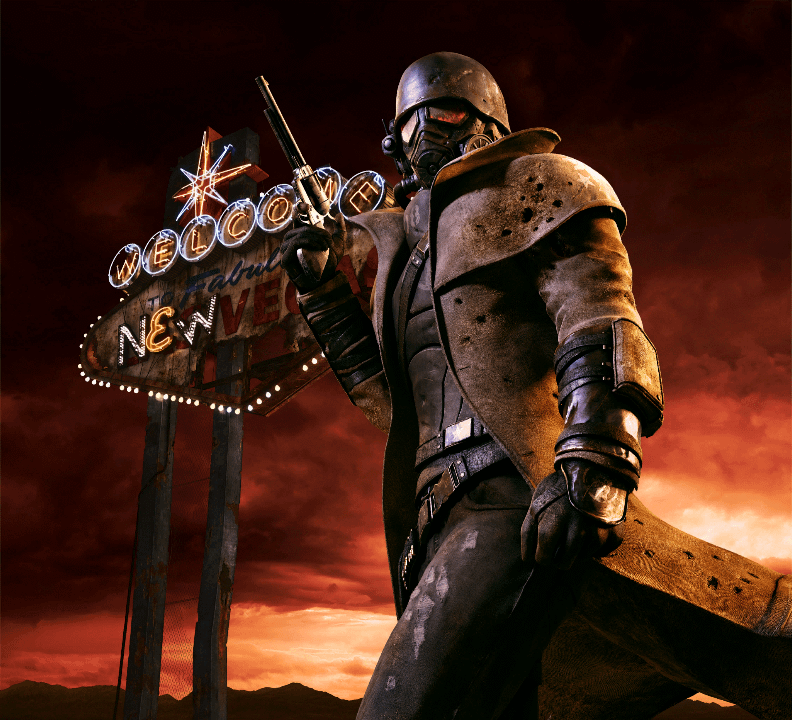Fallout: New Vegas is a definitive piece in creative fiction, not just restricted to its medium of video games. Presenting a vibrant and immersive world reminiscent of 1950’s Americana taken far past Nuclear Holocaust, the game itself could easily coast on its atmosphere and setting; however, it is instead packed to the brim in a plethora of categories. It’s companion characters all possess deep backgrounds and characterizations, with each having their own political opinions and affiliations that react to the player’s own decisions. The factions themselves are ideologically complex and possess unique cultures, with there being 4 core factions that stand vying for dominance over the Mojave Desert and its eponymous crown jewel, New Vegas.

The bureaucratic but slow moving and over-extended NCR or New California Republic, a vestige of old world culture. The autocratic and brutal Caesar’s Legion, under whom human rights are eschewed but traders and protected civilians can find greater safety as they follow the lead of their Caesar. The enigmatic Mr. House, a tech magnate who has staved off death for nearly three centuries and has within the last three decades reemerged supported by an armada of “Securitrons”, or armed security robots. And finally, the collective will of the Mojave as instanced in its smaller roots yearning to be free of these overlords and administrators to be left to their own stewardship. It is within these escalating tensions that the player arrives, a spark to a powder keg.

Rather than being sated merely by giving the player the freedom to choose their alliance, in many ways “Courier 6” (protagonist’s general moniker) directly and indirectly influences the factions they interact with and mold their ideology. One of my personal favorite quest lines within New Vegas revolved around the Fiends, a gang of “Chem” (Fallout universe equivalent to drugs) users and NCR troops located outside New Vegas. After arriving at the NCR outpost and inquiring as to the condition of things, the player is informed that one of the soldiers, Corporal Betsy, was assaulted by a Fiend Leader by the name of “Cook Cook”. While Corporal Betsy originally resisted encouragement to receive help, the player is given a wide variety of options to facilitate them entering psychological treatment for their trauma. And whether by honest means, deception, or coercion, you as the player character is able to help them accept treatment and find peace.
If that were the extent of Corporal Betsy’s characterization, it would already be far ahead of other contemporary story lines save the likes of the Witcher or Cyberpunk. However, Corporal Betsy is a core part of her NCR Sniper squad. Each of her colleagues thinks highly of her, both as a friend with a deadpan but earnest manner, and as a trustworthy soldier whom they know will hold their back. Corporal Betsy is also a lesbian, one of many characters in New Vegas who has some manner of LGBTQ+ identification. The vivid and well-structured way in which these characteristics are presented give these characters a sense of realism and depth, without being ham-fisted in their representation. Attached via hyperlink is a greater summation of the Fallout series’ history regarding LGBTQ+ representation, and the section pertaining to New Vegas details smaller instances of the games’ attitudes. My personal favorite cultural attitude within the game is the ironic proclivity of the Legion to engage in same-sex relationships, despite the faction being homophobic and punishing such relationships with death. Pointing to both the proliferation of homosexuality despite repression, as well as mirroring parallel situations within our own world. Below is a video illustrating the point, by having the player character interact with numerous others to show general sentiments regarding the legion’s sexuality.
